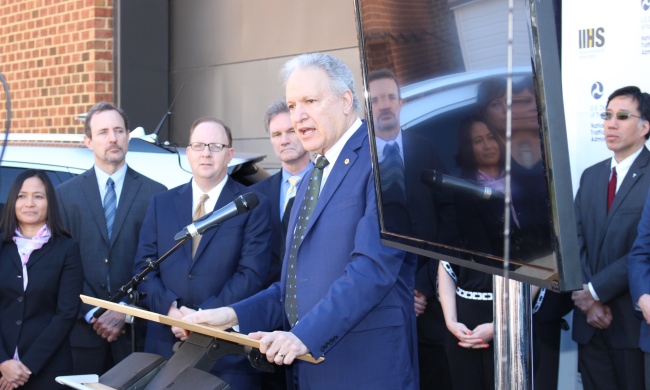Automobile majors have reached an agreement to include automatic emergency braking in almost all the vehicles in the US by September 2022.

The agreement by 20 auto majors has been announced by the US Department of Transportation's National Highway Traffic Safety Administration and the Insurance Institute for Highway Safety.
Automatic emergency braking systems will help prevent crashes or reduce their severity by applying the brakes for the driver.
It will used on-vehicle sensors such as radar, cameras or lasers to detect an imminent crash, warn the driver and apply the brakes on its own if the driver fails to take preventive action.
Automakers who have pledged to install automatic emergency braking sytem in vehicles which will account for over 99% of US light vehicles sales.
Automakers who have signed the pledge include Audi, BMW, FCA US, Ford, General Motors, Honda, Hyundai, Jaguar Land Rover, Kia, Maserati, Mazda, Mercedes-Benz, Mitsubishi Motors, Nissan, Porsche, Subaru, Tesla Motors, Toyota, Volkswagen and Volvo Car USA.
US Transportation secretary Anthony Foxx said: "It's an exciting time for vehicle safety. By proactively making emergency braking systems standard equipment on their vehicles, these 20 automakers will help prevent thousands of crashes and save lives."
"It's a win for safety and a win for consumers."
NHTSA and IIHS had in September 2015 had encouraged the automakers to voluntarily agree to make automatic emergency braking in vehicles a standard feature, based on evidence that the installation prevents crashes and injuries.
IIHS board chairman and CEO of American Family Insurance, Jack Salzwedel said: "IIHS member companies strongly support the adoption of effective safety technologies.
"Deploying AEB on a wide scale will allow us to further evaluate the technology's effectiveness and its impact on insurance losses, so that more insurers can explore offering discounts or lower premiums to consumers who choose AEB-equipped vehicles."
According to IIHS estimates, the installation of AEB equipment will help in preventing 28,000 crashes and 12,000 injuries.
The regulators said that the commitment from automakers will bring the safety technology to vehicles earlier than it would have been possible through the regulatory process.
NHTSA administrator, Dr. Mark Rosekind said: "We're getting these safety systems into vehicles much faster than what would have been otherwise possible."
Following the commitment from the automakers, the AEB will be a standard feature in all vehicles light-duty cars and trucks with a gross vehicle weight of 8,500 lbs. or less starting from 1st September, 2022.
It will also be a standard feature in all trucks with weight of between 8,501 lbs. and 10,000 lbs.
IIHS executive vice president and chief research officer David Zuby said: "The benefits of this commitment are far reaching.
"From injuries and deaths averted to the recovery of productivity that would otherwise be lost in traffic jams caused by the crashes prevented. It also assures that all Americans will benefit from this technology."
National Safety Council president and CEO Deborah A.P. Hersman said: "With roadway fatalities on the rise, the commitment made today has the potential to save more lives than almost anything else we can accomplish in the next six years."
Image: Automakers agree to include Automatic Emergency Braking as standard equipment on new cars by late 2022. Photo courtesy of NHTSA





